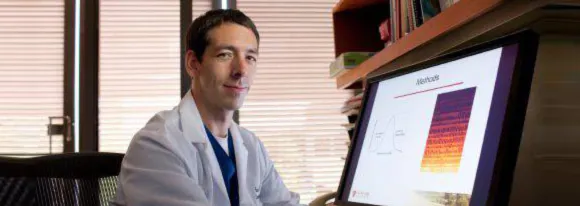
Photo by Mark Tuschman: Euan Ashley is principal investigator of a $7.2 million, four-year grant to fund a
clinical site for the NIH’s new Undiagnosed Diseases Network.
July 1st, 2014, Stanford Medicine News Center, by Erin Digitale
Stanford has received a $7.2 million, four-year grant from the National Institutes of Health to fund a clinical site for the NIH’s new Undiagnosed Diseases Network.
The network expands the NIH Undiagnosed Diseases Program, which was launched in 2008 to help patients who have conditions that skilled physicians have been unable to diagnose despite extensive clinical investigation.
To date, approximately 600 patients from across the United States and seven foreign countries have been evaluated at the program’s pilot site at the NIH Clinical Center in Bethesda, Md. The NIH team has diagnosed about 100 of these patients, discovered two unknown diseases and identified 15 genes not previously associated with any other human disease. These successes prompted the NIH to expand to a network of six more clinical sites across the country, including one at Stanford.
The grant to Stanford will be shared by a multidisciplinary team from the School of Medicine, Stanford Hospital & Clinics and Lucile Packard Children’s Hospital Stanford, and will be used for helping both pediatric and adult patients.
“It’s exciting to be able to offer the latest diagnostic testing, including genome sequencing, to these patients who have often traveled around the country looking for answers,” said Euan Ashley, MD, PhD, principal investigator for the Stanford grant. Ashley, associate professor of medicine and of genetics, is also director of the Clinical Genome Service and the Center for Inherited Cardiovascular Disease at Stanford Hospital & Clinics. “I’m particularly excited now to bring Stanford’s cutting edge to the bedside of these patients,” he said.
Matthew Wheeler, MD, instructor of medicine and the medical director for the grant at Stanford Hospital & Clinics, said, “Stanford was chosen for our informatics expertise, our experience with clinical interpretation of whole-exome and whole-genome data, and our scientific potential to follow up any lead.”
The team will use cutting-edge genomics and medical phenotyping techniques to diagnose patients, and will also aim to understand the underlying biology of patients’ conditions so they can generate targets for new therapies, Wheeler said. “We aim to make a deep dive into each patient’s biology,” he added.
The grant’s co-principal investigators are Paul Fisher, MD, professor of pediatrics and service chief of pediatric neurology at Lucile Packard Children’s Hospital Stanford, and Jon Bernstein, MD, assistant professor of pediatric medical genetics. Bernstein is also medical director for the grant at Lucile Packard Children’s Hospital Stanford.
The grant will support in-depth diagnostic evaluations at Stanford for 50-100 patients per year, who will be evaluated by multidisciplinary teams of specialists for up to five days each. Stanford scientists also will participate in developing approaches to data collection and patient selection, evaluation and diagnosis that will be shared across the entire network.

